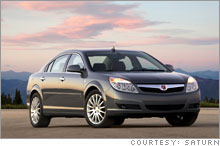|
Saturn: Secrets of the 'no-haggle' price What car dealer wouldn't love to charge full sticker for all their cars? How Saturn does it. NEW YORK (CNNMoney.com) -- Few people actually like the process of haggling for the best price on a new car. In fact, almost two-thirds of car shoppers in a recent survey said they would prefer to pay a single, set price. That's a huge factor in the appeal of General Motor's Saturn car brand. Every car is marked with a price and that's what you pay. While GM (Charts) can't legally forbid dealers from haggling over those prices, the company can mete out "consequences" to dealers who stray.
So, if you bought a Saturn Vue or Ion and your neighbor buys one a week later, you don't have to worry that he got a better deal. Sounds fair, right? Hang on. In a separate part of the same survey, done by Kelley Blue Book's KBB.com Website, only 12 percent of shoppers thought "full sticker price" was fair. After all, nobody pays the manufacturer's suggested retail price for anything. Not electric razors. Not TV sets. Certainly not cars. So, if paying full sticker price for a Chevrolet Equinox wouldn't be fair, why is paying full price for a Saturn Vue such a good thing? Its own orbit This is the way it's pretty much always been. Cars have been haggled over ever since they started being mass produced around 1910, said Bob Casey, curator of transportation at the Henry Ford Museum in Michigan. With various outlets within a short drive of one another, a dealer would be foolish not to consider a customer's request to shave a few hundred dollars off the price. With Saturn cars, however, dealers have agreed not to haggle. And Saturn-parent General Motors will not allow dealerships under different ownership to locate in the same area, reducing competitive pressure. Another thing that protects Saturn's no-haggle policy is that its vehicles are clearly differentiated from other GM products. They are so different, in fact, that many Saturn customers aren't even aware it's a GM brand, said Saturn general manager Jill Lajdziak. For example, if you're shopping for a Chevrolet Equinox SUV, you also have the option of buying a Torrent from a Pontiac dealership. The two crossover SUVs are nearly identical. If you're not particularly attached to that Pontiac grille, you could just go with whichever dealership offers you the better buy. Most shoppers would be unaware that the Saturn Vue, which looks quite different, is actually built on the same engineering platform as the Equinox and Torrent. So, if you want a Saturn Vue, you have no choice but to buy from a Saturn dealer. And the deal is set in stone. Fair deal? People who buy Saturns generally love the no-haggle price. In J.D. Power and Company's annual surveys of dealership satisfaction, Saturn consistently ranks higher than any other non-luxury car brand. But is that pricing policy fair to you, the consumer? The point of a negotiation, after all, is to arrive at a fair price for the product given current market conditions. But remember, "fair" cuts both ways. Pontiac dealers are currently getting prices well above sticker for the Solstice sports car. Saturn sells a version of that car called the Sky. Saturn dealers are, officially, at least, constrained from simply tacking a "dealer premium" onto the Sky even though that higher price might more accurately reflect its real market value. Nevertheless, some Saturn dealerships are finding ways to get extra money for that car, according to a recent report in Automotive News, an industry newspaper. Some are requiring buyers to purchase expensive options or aftermarket products, the paper said. (G.M. says it is taking steps to try to get Saturn dealerships to toe the line on the Sky, said a Saturn spokesman. In spite of that, some dealer are simply tacking on a "dealer's premium," according to the Automotive News report.) But that same sort of creative thinking can also allow Saturn dealers to cut the cost of buying one of their cars. As with other GM cars - and many other cars - there are sometimes rebate and incentive programs on Saturn vehicles. (Saturn rebates are usually smaller, though, said Mark McCready of the auto retailing Website Carsdirect.com) Since manufacturer rebates take nothing from dealer profits, they usually leave plenty of room for further negotiation. When purchasing a car, the car itself is just part of the deal and it's not the only part where negotiation is possible. Most people buying a new car are trading in some other vehicle. The amount offered by the dealership for that used vehicle is negotiable at any dealership. Most buyers will also allow the car dealership to arrange financing for them. The interest charged for the financing includes a certain amount the dealership takes as profit. To that degree, the interest rate is also open to negotiation. So, even if the dealer won't negotiate on price, there are other ways - besides just being nice, which also helps - that they can earn your business. |
| |||||||||||||||||||||||

